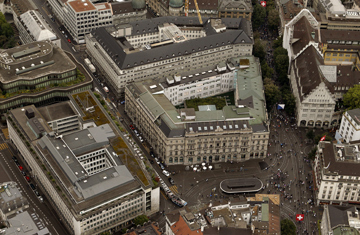
An aerial view shows the headquarters of Swiss banks UBS (front left) and Credit Suisse at the Paradeplatz square in Zurich
If you want the most bang for your buck, you may consider moving to Zurich. And staying away from Jakarta. That's according to UBS Bank, which released a study on Wednesday revealing that the Swiss city, though ranked as the world's second most expensive (after Oslo), offers the highest wages and purchasing power. Other cities in which workers get good value for money: Miami, Los Angeles and Sydney. Those in which a hard-earned salary doesn't go far include Mumbai, Manila and Nairobi.
The study, conducted by the banking giant every three years, examined 73 cities worldwide using a standardized survey of prices and wages and covering 122 goods and services, from groceries and household appliances to transportation and entertainment. It turns out that Geneva, Tokyo, Copenhagen, New York City, Stockholm, Toronto, Montreal and London also hold the top spots on the most-expensive list.
But while Zurich and Geneva are rated among the costliest cities in which to live and work, Switzerland "is still by far the world's leader in terms of wages," the study says. Because of low payroll deductions, net wages are 30% higher in Zurich than in Copenhagen, another city in which employees enjoy high salaries.
Leading the ranking in wages is a double-edged sword, however, says Stephane Garelli, director of the Competitiveness Center at the Institute for Management Development (IMD), based in Lausanne, Switzerland. "Higher earnings mean better standard of living," he says. "But as more wealth is accumulated, prices increase, and that leads to a higher cost of living."
Daniel Kalt, UBS's head of global economic research, says the study's results are driven by sometimes-dramatic fluctuations in exchange rates, which can either propel a major city to the top or push it down in rankings. "A city can suddenly become cheaper or more expensive, and it can happen very fast," he says.
For example, Sydney has risen almost 20 places in the ratings since 2007 because of a 30% appreciation of the Australian dollar against the U.S. dollar. The euro-zone cities, on the other hand, have slipped down in the aftermath of the euro's decline. Kalt can see a silver lining: major European cities have become cheaper tourist destinations for people using currencies that gained against the euro, such as the Swiss franc and the U.S. dollar.
The study also documents a seeming paradox in that while China and Taiwan enjoy the highest GDP growth rates, Manila, Jakarta and Mumbai rate — along with Nairobi — lowest in wages and purchasing power. "The reason parts of Asia and Africa continue to lag behind is that the process of catching up with developed countries is very slow," says Kalt. "It could take decades."
Overall, the difference in the prices for goods and services between Western and Eastern Europe decreased from about 35% at the start of 2009 to about 26%, the study reports. That change can be attributed to "prices and incomes growing in emerging economies and catching up with the developed countries," says Kalt. "Declining value of the euro is also a factor." For South and North America, a similar ratio holds true: in South America, a basket of goods and services is now approximately 32% cheaper than in North American cities.
Are these numbers predictors of future economic trends — and possible blueprints for future economic policy? "It is very difficult to make predictions," Kalt says. "After all, nobody could have foreseen the fall of the euro. So when a study is based on exchange rates, there is just no telling what will happen."
However, IMD's Garelli says there is one conclusion that can be drawn: "The more a country becomes developed, the more prices and costs of living will climb," he says. "The challenge for policymakers is to find the right balance between the two."
